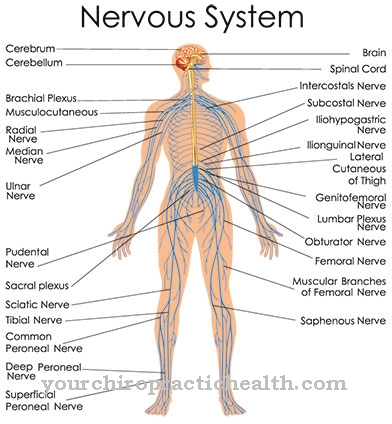As Hearing loss, Hearing impairment or Hearing impairment is a symptom in which normal hearing is impaired. Here, hearing loss can occur as a result of injuries to the hearing and the auditory organs, as well as a typical aging phenomenon in older people. However, more and more younger people are suffering from hearing loss due to noise and noise.
What is hearing loss?

Medicine differentiates between two types of hearing loss: a sudden onset and a chronic one that develops gradually. Elderly people are affected by hearing loss much more often than younger people - this is also known as age-related hearing loss. Every 15th person in Germany is now hard of hearing.
A basic distinction is made between three types of hearing loss: the mild hearing loss, which is associated with a hearing loss of around 20 to 40 decibels. Affected people no longer notice small background noises such as the ticking of a clock. In the case of moderate hearing loss, on the other hand, ambient noises such as the chirping of birds are no longer recognized. In this case, the hearing loss is already between 41 and 60 decibels.
With severe hearing loss, which is associated with a hearing loss between 61 and 80 decibels, the person affected can hardly follow conversations. Any hearing loss that is above these levels is already referred to as deafness.
causes
The most common hearing loss affects people who work in a noisy environment. We speak of loud when it is more than 80 decibels.
Acute hearing loss, which in most cases disappears by itself, can also be caused by improper cleaning of the ears. In principle, you should not go too deep into the ear with the cotton swab - special care is required with small children and babies. If you clean your ears too seldom, the wax that builds up can also lead to hearing impairment.
Some forms of hearing loss are congenital or inherited from the parents. If a pregnant woman falls ill with an infectious disease such as toxoplasmosis or rubella, the newborn can, in the worst case, be born with a hearing loss.
Other diseases can also trigger the symptom of hearing loss. These include both otitis media and injuries to the eardrum as well as inflammation of the ear canal. Sudden hearing loss can also be a side effect of tuberculosis, mumps or measles.
You can find your medication here
➔ Medicines for ear complaints and hearing problemsDiseases with this symptom
- Sudden hearing loss
- concussion
- Acoustic neuroma
- Timpani effusion
- Pop trauma
- Otosclerosis
- Cerebral hemorrhage
- Ear canal exostosis
- Meniere's disease
- Age-related hearing loss
- Encephalitis
- Eardrum injuries
Complications
The course of a hearing loss mainly depends on its cause and on whether it is conductive or sensorineural hearing loss. The latter form, sensorineural hearing loss, is usually not treatable in the sense of an improvement in hearing performance and the processing of sound signals that have been correctly reported by the auditory nerve to the processing brain areas.
The possible complications of untreated hearing loss are mainly the development of physical (somatic) complaints and the onset of social isolation due to the difficult direct communication. The possible physical complaints such as headache, muscle pain and high blood pressure as well as increased stress symptoms result from the constant increased tension and concentration in order to compensate for the hearing loss during direct conversation with other people.
In the psychological and social area, the untreated hearing loss can lead to considerable complications. Self-esteem suffers and people often experience rejection because many people do not know how to communicate and deal with people who are hard of hearing. The above complications can also arise with the hearing loss being treated.
In addition to the technical and physical improvement in hearing, a large part of the therapy should also address possible psychological and social complications. The dangers in the psychological and social area can be countered through targeted mental training with practical exercises.
When should you go to the doctor?
As a rule, hearing loss is not a special or dangerous medical complication and does not necessarily have to be treated by a doctor. However, the hearing loss leads to severe restrictions in the patient's life and should therefore be remedied if possible. A visit to the doctor is therefore always advisable, as the hearing loss usually only increases if the patient amplifies certain noises, as they can no longer hear them properly. This further damages the eardrum.
A doctor should be seen especially if the hearing loss occurs suddenly or at a young age. This could be another underlying condition that may not have been identified. Even after an accident or after a blow to the head or ears, a doctor or the hospital should be consulted in the event of hearing loss.
In elderly patients, hearing loss is a common symptom. As a rule, direct treatment is not possible. This group of people can also contact a hearing aid manufacturer directly in order to obtain a suitable hearing aid. If you have a hearing loss, you should always consult your ENT doctor directly.
Doctors & therapists in your area
Treatment & Therapy
To find out the cause of the hearing loss, the doctor will perform various hearing tests. The otoscopy can also help to identify physical changes in the ear. If ear wax is the cause of the hearing problems, it can easily be suctioned off by the ENT doctor or removed with a pair of pliers. In the case of slight blockages, this can also be done with the help of a rinse.
The treatment of hearing loss depends on the exact cause and can be done either with medication or with surgery.
If, for example, a sudden hearing loss is the reason for the sudden hearing loss, infusions with medication that stimulate blood circulation and also have a decongestant effect can help. It is not uncommon for sudden hearing loss to result from infections caused by viruses or bacteria.
These can be combated quickly with antibiotics. In many cases, however, only a hearing aid that is individually adapted for each patient helps. Even if they are completely deaf, there is still help: the so-called cochlear implant can help affected people to hear again.
Outlook & forecast
In most cases, hearing loss cannot be treated by a doctor or self-help methods. If the eardrum or other parts of the ear are damaged, they can often no longer be repaired and the hearing loss remains.
As a rule, the hearing loss leads to a greatly reduced quality of life. It is relatively difficult for the person concerned to cope with everyday life themselves. Patients often need help from other people.
In most cases, hearing loss occurs in old age and is a common symptom. However, it can also arise from accidents or from excessive strain on the ears at a young age. In this case, the hearing loss leads to depression and other psychological problems.
The hearing impairment can be counteracted relatively well with the help of hearing aids. These amplify signals so that the patient can hear better again. Anyone with a hearing loss should definitely not live without a hearing aid.
You can find your medication here
➔ Medicines for ear complaints and hearing problemsprevention

To prevent hearing loss, you should not necessarily expose yourself to a noisy environment. In some professions, however, this cannot be avoided. Workers who are exposed to a volume of over 80 decibels must therefore wear hearing protection in accordance with the regulations for occupational safety.
In the discotheque or at concerts, the volume just as often reaches alarming limits. Furthermore, all injuries and disorders of the ear and eardrum must be avoided. In winter you shouldn't stand in the cold draft without warm head and ears covering.
You can do that yourself
Unfortunately, there are no methods of self-help for people with hearing loss. Damage to the ear is usually irreversible and cannot be reversed by a doctor. In many cases, the patient with the hearing loss will have to live their entire life. However, the cause of the symptom must first be clarified.
In some cases, ear wax can lead to hearing problems, but you cannot remove it yourself with a cotton swab; this is the job of an ENT specialist. In general, it is important to avoid hearing all noises very loudly due to the hearing loss. This mainly affects people who listen to music, watch TV or make phone calls. Here the ear is only more damaged by the loud noises, which increases the hearing loss. It is advisable to wear a hearing aid whenever you need to hear sound. In many cases, a hearing aid can be connected directly to another device so that background noise is masked out and not amplified.
If psychological problems arise due to the hearing impairment, it is always helpful to talk to friends, partner or acquaintances. It is also advisable to talk to other people who are hard of hearing or to communicate in some other way. If you have a very severe hearing loss, it is worth learning the sign language. This makes communication easier for those affected. There are books or videos and instructions on the Internet for this.
























.jpg)



